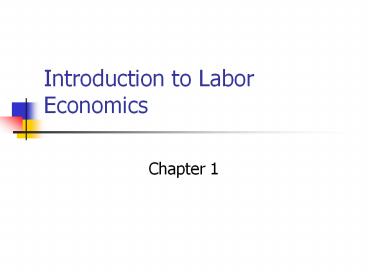Introduction to Labor Economics - PowerPoint PPT Presentation
Title:
Introduction to Labor Economics
Description:
labor productivity is affected by pay and working conditions, and ... test of model based on predictions, not assumptions. Fundamental positive economic concepts ... – PowerPoint PPT presentation
Number of Views:95
Avg rating:3.0/5.0
Title: Introduction to Labor Economics
1
Introduction to Labor Economics
- Chapter 1
2
The study of labor economics requires a solid
foundation in microeconomics.
Review material may be found at http//www.oswego
.edu/kane/eco101.htm
3
Microeconomics background
- The study of labor economics requires a solid
foundation in microeconomics - Review material may be found at
http//www.oswego.edu/kane/eco101.htm
4
Labor market vs. other markets
- labor services are rented, not sold,
5
Labor market vs. other markets
- labor services are rented, not sold,
- labor productivity is affected by pay and working
conditions,
6
Labor market vs. other markets
- labor services are rented, not sold,
- labor productivity is affected by pay and working
conditions, and - the suppliers of labor care about the way in
which the labor is used.
7
Positive vs. Normative Economics
- Positive economics - an attempt to describe how
the economy operates using the scientific method.
8
Positive vs. Normative Economics
- Positive economics - an attempt to describe how
the economy operates using the scientific method. - Normative economics - relies on value judgments
to evaluate the overall functioning of the
economy.
9
Positive economics
- abstraction
10
Positive economics
- abstraction
- ceteris paribus assumption
11
Positive economics
- abstraction
- ceteris paribus assumption
- test of model based on predictions, not
assumptions
12
Fundamental positive economic concepts
- scarcity
13
Fundamental positive economic concepts
- scarcity
- rational self-interest
14
Fundamental positive economic concepts
- scarcity
- rational self-interest
- utility maximization
15
Fundamental positive economic concepts
- scarcity
- rational self-interest
- utility maximization
- profit maximization
16
Normative economics
- interpersonal comparisons of utility are
impossible
17
Normative economics
- interpersonal comparisons of utility are
impossible - Pareto improvement
18
Normative economics
- interpersonal comparisons of utility are
impossible - Pareto improvement
- Pareto efficiency (aka Pareto optimality)
19
Normative economics
- interpersonal comparisons of utility are
impossible - Pareto improvement
- Pareto efficiency (aka Pareto optimality)
- problems with the Pareto optimality criterion
20
Markets and Pareto optimality
- under ideal conditions, markets result in Pareto
efficient outcomes
21
Types of Market failure
- imperfect information,
22
Types of Market failure
- imperfect information,
- transaction barriers,
23
Types of Market failure
- imperfect information,
- transaction barriers,
- price distortions,
24
Types of Market failure
- imperfect information,
- transaction barriers,
- price distortions,
- the nonexistence of markets when externalities
are present,
25
Types of Market failure
- imperfect information,
- transaction barriers,
- price distortions,
- the nonexistence of markets when externalities
are present, - public goods,
26
Types of Market failure
- imperfect information,
- transaction barriers,
- price distortions,
- the nonexistence of markets when externalities
are present, - public goods, and
- capital market imperfections.
27
Equity vs. Efficiency
- Attempts to make market outcomes more equitable
often results in the loss of economic efficiency.































